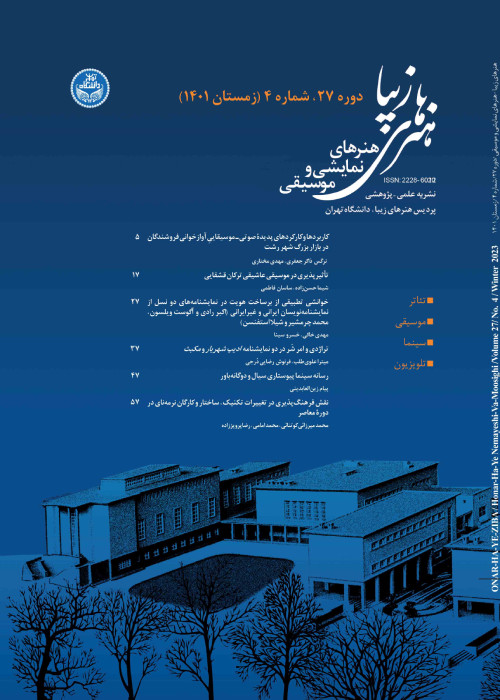Being, Time, and Cinema* A Study of the Philosophy of Henri Bergson on Gilles Deleuze's Philosophy of Cinema
Author(s):
Abstract:
In addition to his revolutionary philosophy and his fundamental criticism on psychoanalysis to which he owes his fame, Gilles Deleuze, the great philosopher, devotes an important part of his thought to formulating the ontology of cinematic image and hence turned out to be known as the only philosopher of cinema. Thanks to the multiple classifications of images and creating philosophical concepts for cinema, Deleuze in his two cinematic books namely Cinema 1: movement-image and Cinema 2: time-image reshapes the relation between the world and cinematic eye and therefore turns his works to something more than mere cinematic books through focusing on the category of time and movement. The first book deals with the issue of movement and explores the works that provides an understanding of movement-image. The second book speaks about the issue of time and shows that modern cinema can provide an understanding of time-image. In addition, in these works, he deals with diverse conceptions such as montage, decoupage, shot and
and argues that we should understand these concepts in terms of philosophy, and then he compares them with mechanisms of the world and human perception. It can be said that Deleuze tries to eliminate the gap between cinema and thought, on the one hand, and cinematic world and real world on the other hand. This brings his cinematic approach to the extent that recognizes cinema and image as immanent in the world and being. At the end of the second book, he states the question of what is cinema?can be replaced by the question of what is philosophy?, because cinema is a function of images and symbols which it's theory of philosophy should be developed as conceptual practice and action and that no areas including semiotics or psychoanalysis has adequate competence to create concepts that are specific to cinema. For Deleuze, cinema as a pure form of thought is different from other arts. In fact, cinema possesses autonomy and special features that give to it a privileged position. The singular idea of cinema obtains through creating images and hence, does not need something else. In the matter of time, Deleuze follows Henri Bergson who believes that time is not quantitative phenomenon but a qualitative one that during its contractions and expansions, encompasses the whole world. This makes Deleuze's approach as meditations about essence of life and world. Therefore, although Deleuze is indebted an important part of his philosophy to the thinkers such as Nietzsche and Spinoza, in argument about cinema, Bergson is the only influential and lasting thinker on his work. Using Bergson's concepts like duree, elan vital and
Deleuze considers cinema as a field of immediate manifestation of movement and time which exceeds or go beyond a mere aesthetic art. In this study, by explaining Deleuze's interpretation of Bergson's concepts attempt is made to reveal the profound impact of Bergson on Deleuze's cinematic ontology despite his outspoken opposition with cinema. Explaining Deleuze's interpretations of Bergson, we finally demonstrate how Deleuze through Bergson, regards cinematic perception as the only perception of the world
Keywords:
Henri Bergson , Gilles Deleuze , Movement , Image , Time , Image , Duree
Language:
Persian
Published:
Honar-Ha-Ye-Ziba: Honar-Ha-Ye Mosighi Va Namayeshi, Volume:21 Issue: 53, 2016
Pages:
35 to 50
magiran.com/p1548174
دانلود و مطالعه متن این مقاله با یکی از روشهای زیر امکان پذیر است:
اشتراک شخصی
با عضویت و پرداخت آنلاین حق اشتراک یکساله به مبلغ 1,390,000ريال میتوانید 70 عنوان مطلب دانلود کنید!
اشتراک سازمانی
به کتابخانه دانشگاه یا محل کار خود پیشنهاد کنید تا اشتراک سازمانی این پایگاه را برای دسترسی نامحدود همه کاربران به متن مطالب تهیه نمایند!
توجه!
- حق عضویت دریافتی صرف حمایت از نشریات عضو و نگهداری، تکمیل و توسعه مگیران میشود.
- پرداخت حق اشتراک و دانلود مقالات اجازه بازنشر آن در سایر رسانههای چاپی و دیجیتال را به کاربر نمیدهد.
In order to view content subscription is required
Personal subscription
Subscribe magiran.com for 70 € euros via PayPal and download 70 articles during a year.
Organization subscription
Please contact us to subscribe your university or library for unlimited access!



